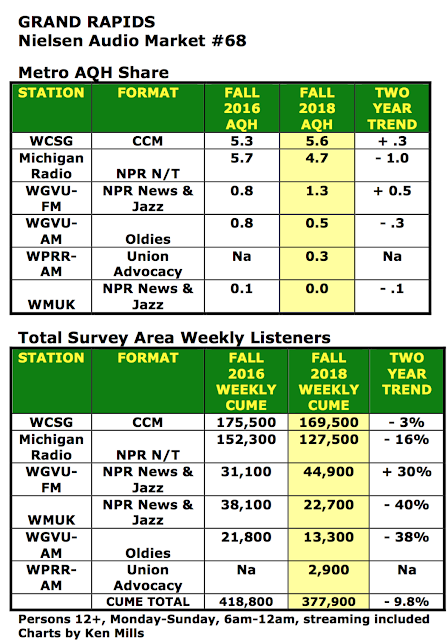 |
| Linda Stowe was SPR's CFO for 28 years |
Linda
Stowe was one of unsung heroes of public media. She was the Chief Financial
Officer at Spokane Public Radio (SPR) [link] and spent almost three decades
working behind the scenes at the station. When Stowe died last week from cancer
at the age of 62, it was a death in the family.
In
a note to members, underwriters and community leaders [link], SPR President and
General Manager Cary Boyce, paid tribute to Stowe:
 |
| Cary Boyce |
"Our SPR community has
been devastated by the sudden passing of Linda Stowe, SPR’s chief financial
officer for 28 years. Many of our listeners, volunteers, and members knew Linda
personally."
"Her expertise, her dedication, and her devotion to the mission of
Spokane Public Radio were simply remarkable, and we are eternally grateful for
her service."
SPR
went through many changes during Stowe’s tenure. When she was hired as Business
Manager in 1990 SPR was just one station, KPBX. At the time, KPBX had a very
small paid staff and needed to beg for every dollar. Today SPR has three
distinct program channels, a paid staff of almost 20 and annual revenue of around
$1.9 million.
Through
all of the changes, pledge drives and capital campaigns, Stowe guided and
guarded the station’s financial health. Co-workers praise Stowe for her direct
manner and unassailable honesty. She was not only a meticulous accountant, she
was the glue that kept people together.
She is remembered for her kindness and loyalty, particularly to station
members.
Boyce and others at SPR has started a "Linda Stowe Memorial Fund" to honor her. Proceeds go to SPR’s news efforts. For more information contact Cary Boyce at (509) 328-5729 or kpbx@kpbx.org.
KEN SAYS: There is likely a person at your shop like Linda Stowe. Don’t take this person for granted. Say thank you today!
Spokane Public Radio operates three stations in Spokane. KPBX airs NPR News and Classical music, KSFC airs NPR News/Talk 24/7 and KPBZ carries PRX Remix full-time. KPBZ is the only station in a Nielsen rated market (that we know of) that devotes their entire schedule to Remix.
Spokane is a very competitive noncommercial station market. It is measured using Nielsen’s Diary methodology.
In addition to the stations listed in the chart on the left, there are two other noncom stations that typically have significant listening: KAGU 88.7 FM at Gonzaga University is 24/7 Classical and KWMU 89.5 FM at Eastern Washington University airs full-time Jazz.
The AQH share and estimated weekly listeners to both KPBX and KSFC were lower in Fall 2018 compared to Fall 2018.
Northwestern Public Radio (NWPR) operates to programming channels out of their base in Pullman. Neither puts a local signal into Spokane but are factors in the Total Survey Area. The two NWPR channels – NPR News/Talk and Classical music are on networks of repeater stations and translators than over most of the state of Washington.
We
discussed WAMC’s audience in Burlington-Plattsburgh yesterday.
Today we get to
see WAMC’s performance in their home market, Albany-Schenectady-Troy.
WAMC
typically does very, very well in Albany and Fall 2018 is no exception. Compared
to Fall 2016, WAMC’s AQH share was up slightly but estimated weekly listeners
were down by 9%.
Chris
Wienk programs Classical WMHT plus co-located AAA WEXT. Both stations increased
their AQH shares in Fall 2018 compared with Fall 2016. Look for WEXT’s weekly
listeners to grow in the Spring 2019 book.
As we reported on January 2, 2019
[link] WEXT has added a second signal at 106.1 FM that reaches areas of the
metro not served by the primary frequency.
Grand
Rapids is very important to Michigan Radio, which is based in Ann Arbor. “GR”
as local folks call the city, is the second largest city – after Detroit – in
Michigan Radio’s mini-network. Their repeater station in GR lost ground in both
AQH share and estimated weekly listeners in Fall 2018 compared to Fall 2016.
Nielsen
uses Diary methodology in Grand Rapids.
Hometown
WGVU-FM, with a dual format of NPR News and Jazz had their best “book” in
recent memory, including a 30% jump in estimated weekly listeners.
Christian
Contemporary Music (CCM) WCSG is the top noncommercial station in the market. WCSG
is a pioneer of the CCM format.






The $64,000 question about WAMC is how much of the success is institutional and how much is because of one man: Alan Chartock.
ReplyDeleteAlan's a character, to put it mildly. I don't always agree with him but I never think he's anything less than thoughtful, if not a genius, in everything he says. And his smarts, charisma, and sheer radio talent have propelled WAMC to amazing heights. Problem is, he's 77 years old. I don't know that he'll ever retire but sooner or later death will come for him like it comes for all of us. And considering how much fundraising (both on-air and major donor) he does, I hope WAMC can handle it after he's gone. Considering how much government watchdogging Albany desperately needs, any diminishment of WAMC would be a tragedy.